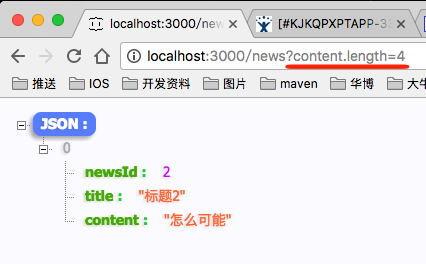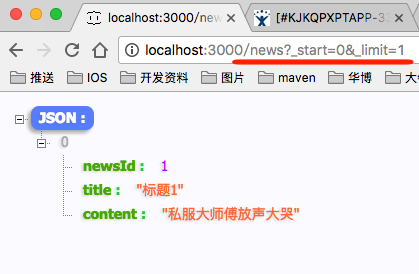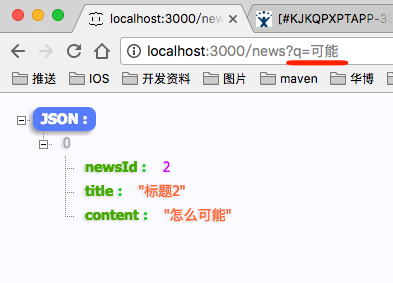一般情况下,一个APP的数据都需要等待接口人员开发完对应的接口才可以获取到,这样子的效率有点低。最好是我们可以自己模拟接口数据,进行页面的数据填充,打通所有关节,之后等接口开发好了,改下接口地址就好了。
我们今天所要讲的工具:json-server就能实现这样的功能。
1、安装json-server
首先我们的电脑要安装有nodejs,然后使用npm命令来安装:sudo npm install -g json-server(windows系统的不需要加sudo)
MeWifi:~ cjy$ npm install -g json-server
/usr/local/bin/json-server -> /usr/local/lib/node_modules/json-server/bin/index.js
- ms@0.7.1 node_modules/json-server/node_modules/compression/node_modules/ms
/usr/local/lib
└─┬ json-server@0.11.2
├─┬ compression@1.7.0
│ ├── bytes@2.5.0
│ └── debug@2.6.8
├── cors@2.8.4
├─┬ express-urlrewrite@1.2.0
│ └─┬ path-to-regexp@1.7.0
│ └── isarray@0.0.1
├── please-upgrade-node@1.0.1
├─┬ update-notifier@1.0.3
│ └─┬ latest-version@2.0.0
│ └─┬ package-json@2.4.0
│ └─┬ got@5.7.1
│ └─┬ readable-stream@2.3.3
│ └── isarray@1.0.0
└─┬ yargs@6.6.0
└─┬ read-pkg-up@1.0.1
└─┬ read-pkg@1.1.0
└─┬ normalize-package-data@2.4.0
└── hosted-git-info@2.5.0
检验是否安装成功,查看json-server配置项:json-server -h
MeWifi:~ cjy$ json-server -h
/usr/local/bin/json-server [options] <source>
选项:
--config, -c Path to config file [默认值: "json-server.json"]
--port, -p Set port [默认值: 3000]
--host, -H Set host [默认值: "0.0.0.0"]
--watch, -w Watch file(s) [布尔]
--routes, -r Path to routes file
--middlewares, -m Paths to middleware files [数组]
--static, -s Set static files directory
--read-only, --ro Allow only GET requests [布尔]
--no-cors, --nc Disable Cross-Origin Resource Sharing [布尔]
--no-gzip, --ng Disable GZIP Content-Encoding [布尔]
--snapshots, -S Set snapshots directory [默认值: "."]
--delay, -d Add delay to responses (ms)
--id, -i Set database id property (e.g. _id) [默认值: "id"]
--foreignKeySuffix, --fks Set foreign key suffix (e.g. _id as in post_id)
[默认值: "Id"]
--quiet, -q Suppress log messages from output [布尔]
--help, -h 显示帮助信息 [布尔]
--version, -v 显示版本号 [布尔]
示例:
/usr/local/bin/json-server db.json
/usr/local/bin/json-server file.js
/usr/local/bin/json-server
http://example.com/db.json
https://github.com/typicode/json-server
2、运行
在任意的目录创建一个json文件,例如在json目录创建data.json文件,写入以下内容,并在json目录下执行json-server data.json
{
"list": {
"news": [
{
"newsId": 1,
"title": "标题1",
"content": "私服大师傅放声大哭"
},
{
"newsId": 2,
"title": "标题2",
"content": "怎么可能"
}
]
},
"detail": {
"object": {
"name": "我是大锤",
"sex": 1,
"isComplete": true
}
}
}
成功的话会出现如下内容
MeWifi:~ cjy$ cd /工作/json/
MeWifi:json cjy$ json-server data.json
{^_^}/ hi!
Loading data.json
Done
Resources
http://localhost:3000/list
http://localhost:3000/detail
Home
http://localhost:3000
Type s + enter at any time to create a snapshot of the database
接下去就可以访问了:

3、常用操作
json-server支持GET, POST, PUT, PATCH 和 DELETE 方法,更提供了一系列的查询方法,如limit,order等。
这里主要介绍下它的强大的过滤功能。
示例数据源:
[
{
"newsId": 1,
"title": "标题1",
"content": "私服大师傅放声大哭"
},
{
"newsId": 2,
"title": "标题2",
"content": "怎么可能"
}
]
属性值(Filter)
使用 . 操作对象属性值
//获取content的长度为4的数据

排序(Sort)
使用 _sort 和 _order (默认使用升序(ASC))
//按照newsId降序排列

分割(Slice)
使用 _start 和 _end 或者 _limit
//从下标0(第一个对象)开始,获取1条数据

全文检索
使用 q,在对象全部value中遍历查找包含指定值的数据
//查找全部字段包含“可能”的数据

使用 _like 进行模糊查找 (支持正则表达式)
//查找content中含有“大哭”字样的数据

还有一些操作,可以参考这篇文章:json-server说明